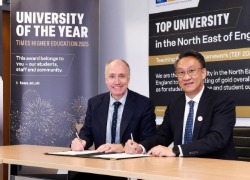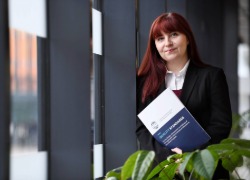Environmental partnership proves its worth
A partnership between Teesside University and Cleveland Potash is set to deliver real environmental benefits by reducing the company’s energy usage.
Cleveland Potash, which runs Boulby Mine, is committed to reducing its impact on the environment and has teamed up with the University’s School of Science & Engineering to tap into scientific knowledge and expert support.
They’re doing it through a Knowledge Transfer Partnership (KTP) – an established initiative that draws on University expertise to help increase a company’s competitiveness, productivity and profits.
KTPs are a three-way partnership between a company, a university and a talented graduate, who together work to address a business issue or development project.
As part of the KTP, Teesside postgraduate Balaji Vasudevan is working on the reduction of particle emissions. Based at Cleveland Potash, he works under the supervision of Dr Zhang, a senior lecturer in the School of Science & Engineering, who makes monthly visits to the company.
The partnership began when Cleveland Potash Limited approached the University to work together to improve some of the process controls in the Potash refining plant. This twofold benefit would be improvements in the emissions and also reduction in fuel consumption and energy costs.
The outcome was a two-year KTP, funded by the Technology Strategy Board, which ends in June 2012.
Excellent support from the University
Jennie Thomas, Environmental Services Manager, said, 'There is a legal limit to particle emissions from our stack, set by Redcar and Cleveland Council and although we operate well within the limits we want to ensure that our operations don’t affect these levels. Developing control strategies with the Plant Manager and his operators will help us to improve continually.
'This project and the support from the University is excellent in helping us in our commitment to the environment. Balaji is absolutely excellent. We’ve also had fantastic communications with Dr Zhang and Dr Paul Russell at the University. It’s been a very rewarding process and we’re looking to take Balaji’s work further.'
Balaji, 25, from India, has a Master of Science degree in Petroleum Technology from the University. He said, 'I worked first on a Collaborative Innovation Partnership (CIP), a six-month project with the University which explored how to reduce the company’s particle emissions and make energy savings. This project identified the process disturbances that could impact on particle emissions.
'I’m now looking at the best possible systems to reduce these emissions further without impacting on the production capability of the plant. There are a number of ways, for example trying to balance dryer feed rates and control methodology. My research has indicated that by reducing the variability of dryer control the emissions can be further improved and energy consumption in the drying process can also be improved. An online particulate monitor has been trialled and is now installed in the plant. This has been trialled as part of the KTP function.'
For more information on KTPs at Teesside University please call 01642 384068, email BusinessTeam@tees.ac.uk
 Start the new year by expanding your knowledge
Start the new year by expanding your knowledge  Teesside University strengthens long-standing partnership
...
Teesside University strengthens long-standing partnership
... Teesside academic leads the way in setting professional
...
Teesside academic leads the way in setting professional
...